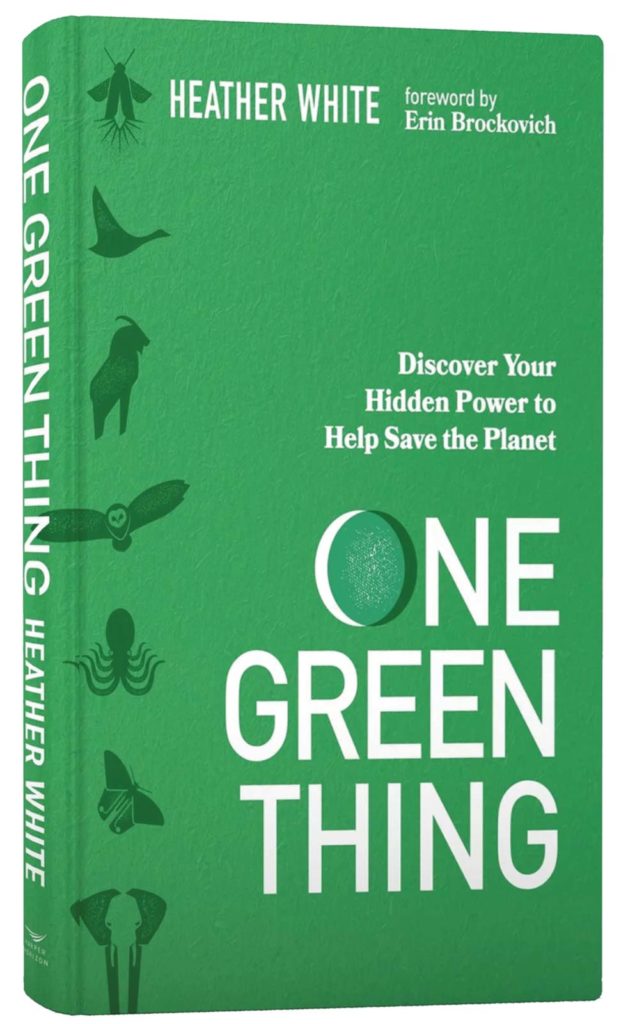Heather White’s One Green Thing

“Tell me, what is it you plan to do with your one wild and precious life?” famously asked American poet Mary Oliver. I entered this world in 1999, barely grasping the last century, and I dwell in the current century’s existential crisis in search of signs of stability— all whilst being an optimist.
For some, this grim assessment might seem like an overstatement for the current state of affairs. But, as environmentalist and author Heather White understands, eco-anxiety is plaguing young populations and how they bear this one wild and precious life.
Lawyer, author, former Senate staffer, and environmental policy expert are just a few titles Heather White holds, and this diverse skill set, accumulated over decades, makes her recent publication, One Green Thing, a trusted guide for individual contribution to the climate conservation fight. White rejects the notion of gatekeeping the climate movement, insisting on an inclusive, multigenerational approach for comprehensive climate solutions.
This consideration includes future generations by adopting cathedral thinking—an approach where policymakers and other stakeholders lay plans for their descendants to complete. A prime example of this exists in our backyard: Yellowstone National Park. As White notes, in 1872 President Ulysses S. Grant signed Yellowstone National Park into being for the “benefit and enjoyment of the people.” Today, 150 years later, the sacred lands of the world’s first national park enchant tourists and locals alike as a reminder of wild beauty.
But what will become of Yellowstone in another 150 years? Will there only exist remnants of the fragile Yellowstone of today that endures volatile wildfires, flooding, and other fallout from increasing temperatures?
White interprets The Global Climate Risk Index, which obtains data on climate-induced extreme weather from 1999 to 2018, and concludes that Puerto Rico, Haiti, and Myanmar were the most impacted. However, the top polluters over those two decades were China, India, the Russian Federation, Japan, and—you guessed it—the United States. Negative externalities upon minor contributors might seem an afterthought to those nations. White’s solution: Extend your compassion to others’ palpable loss.
Climate equity is essential to conversations circulating on environmental policy. Black, Indigenous, and People-of-Color communities are disproportionately affected by issues related to pollution and climate. “Black Americans are 75 percent more likely to live near facilities that produce hazardous waste and air pollution,” White says. This greatly affects the health of those neighborhoods, and the infrastructure to combat these threats is lacking.
When reading books about global warming or climate change, the reader is often inundated with a litany of facts, all leading to impending peril. While facts rooted in scientific studies are essential, they can also be paralyzing. Like a fight-or-flight response, fear propels some to action, while others favor avoidance. What differentiates White’s One Green Thing from other climate-crisis literature is her recognition of human nature. She breaks down common personalities and suggests ways each personality type can cope with and engage in the crisis at hand. In addition, she provides journal prompts at the end of each chapter and a monthly guide for small acts you can do for everyday climate justice. One Green Thing educates through personalized interaction, a supreme way of learning. “It’s in society’s best interests for you to be the best version of yourself,” White writes. And that means not forcing yourself into a mold that isn’t sustainable for you.
The depreciation of personal power—your powers—for the betterment of society and climate change is a war Heather White bravely wages. Passing the baton to the next person disrespects your own capabilities in the biggest battle of our lifetime. Pick up a copy of One Green Thing at your local bookstore. It’s a must-read for all ages.

